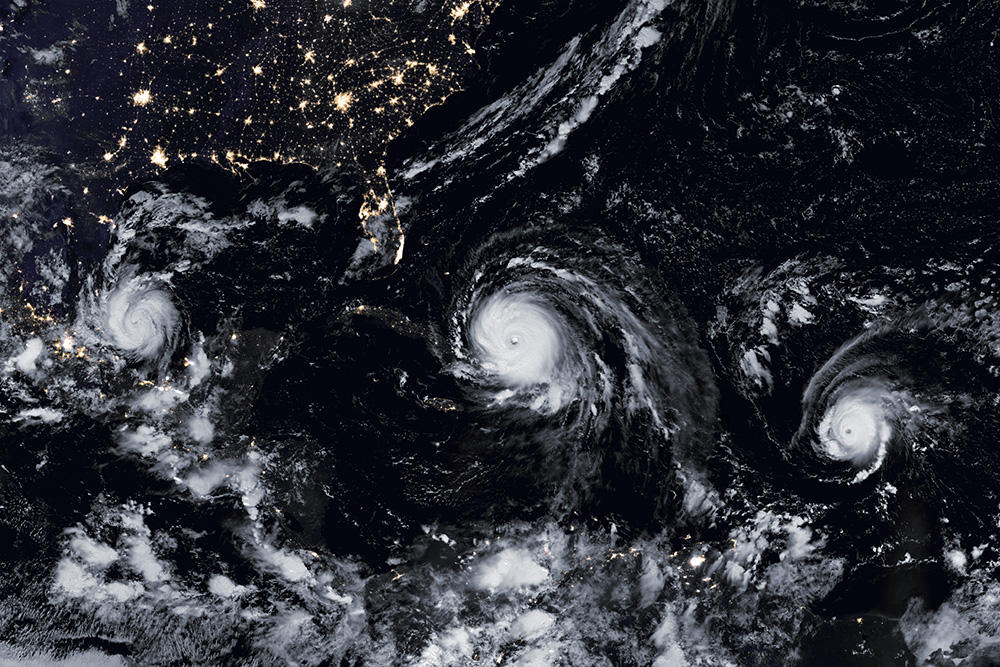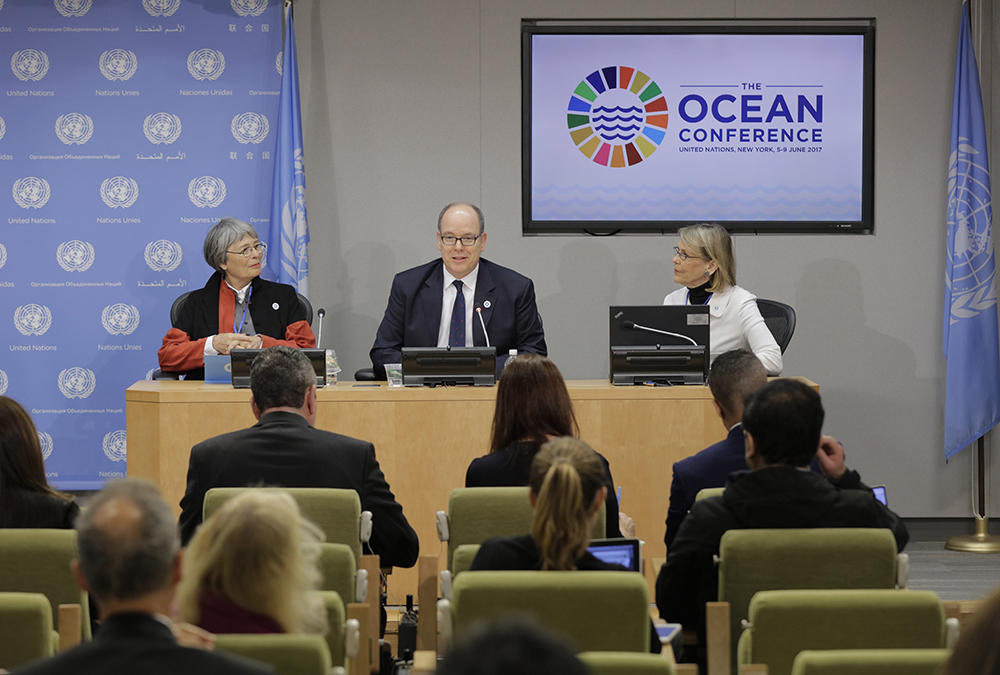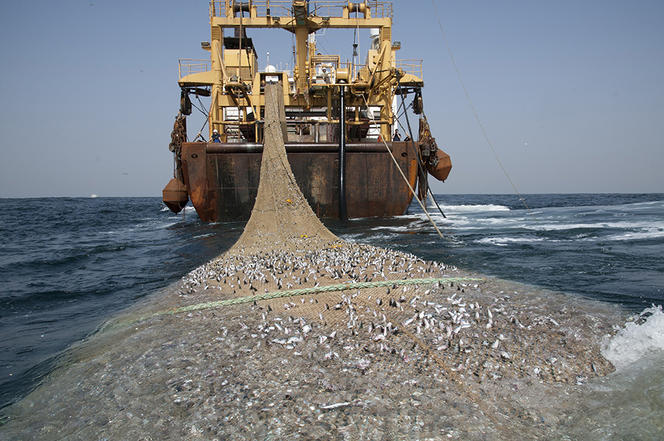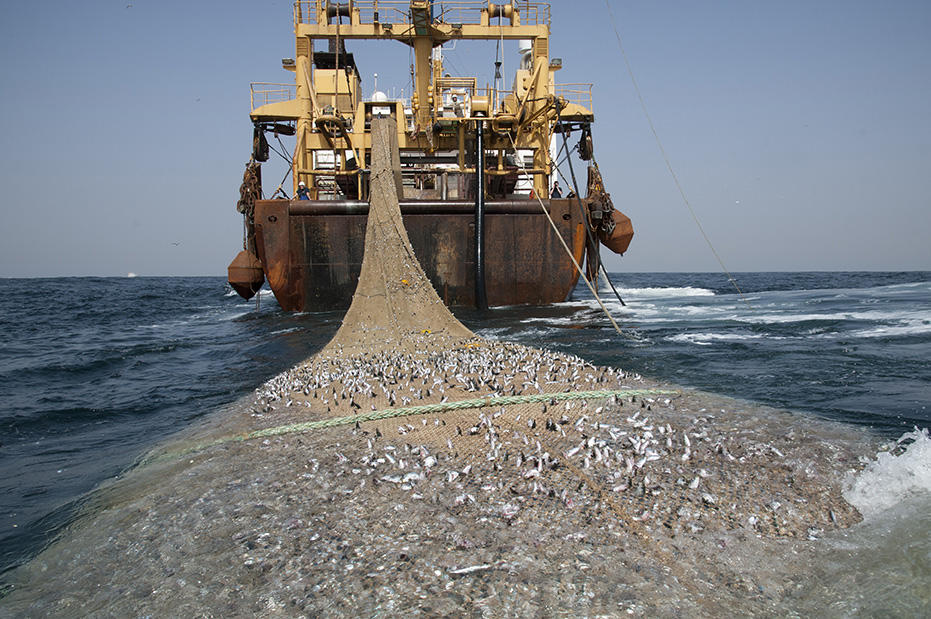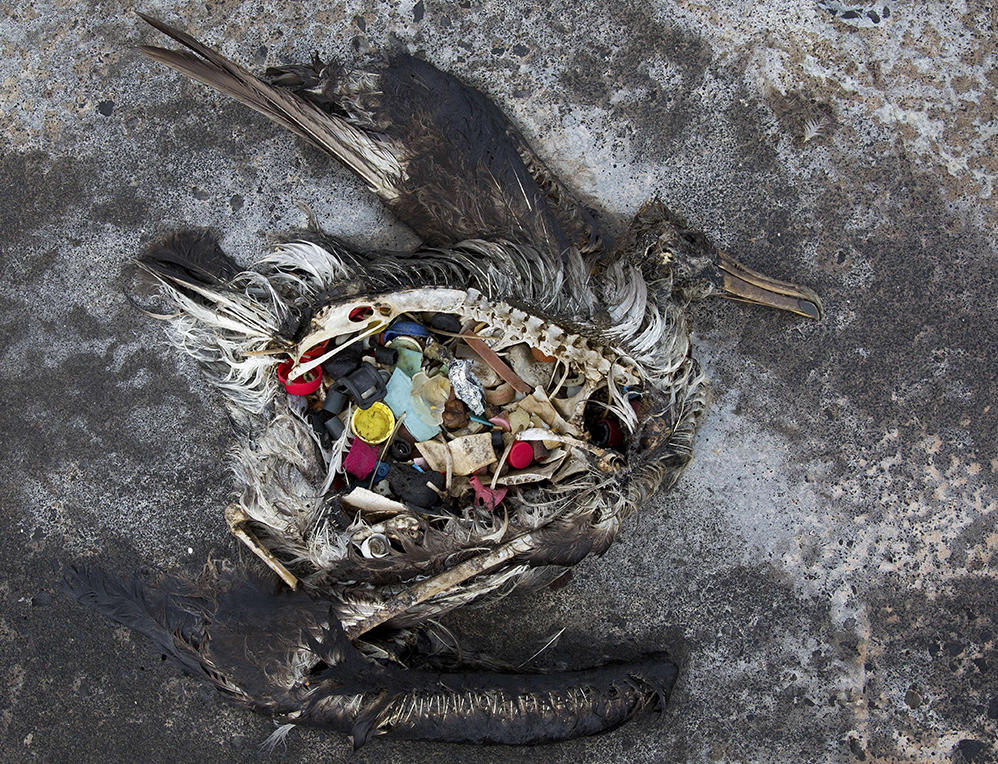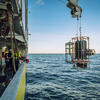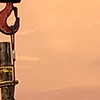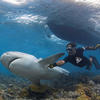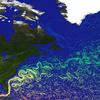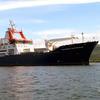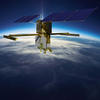You are here
A Deep Blue Challenge
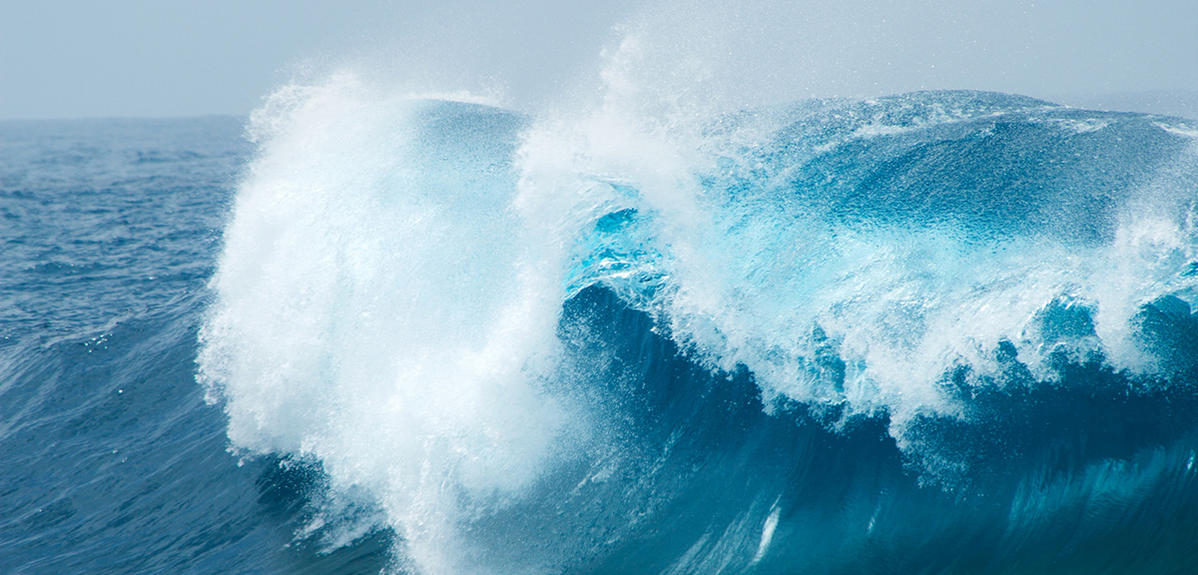
Interview with researchers Agathe Euzen,1 Françoise Gaill,2 Denis Lacroix,3 Philippe Cury,4 editors of The Ocean Revealed, available as a free download.
There are no better concrete examples of how the ocean and atmosphere interact than the powerful hurricanes that are devastating the Caribbean this season. What goes through your mind when you watch these events unfold?
Françoise Gaill: They focus our attention on the climate—and on the importance of the ocean in regulating it. Hurricanes are the direct result of ocean-atmosphere interaction, and yet we seem to have neglected the 'ocean' part of that interaction. The second point is that such events show the urgency of dealing with climate change. These islands are on the front line. In terms of sea-level rise, they are sentinels, and are indeed the most exposed and at risk, followed by the eastern coast of the US, with all its cities—New York, Miami... And that's just North America. You look at the Maldives, Bangladesh, which is now a third underwater... Engineering will have to protect these areas or they will simply be erased from the map.
Philippe Cury: We live in a world in evolution. We've always experienced climate "changes," but they were variations. What we are going through today is only just the beginning, whether in terms of hurricane intensity, extreme events, or transforming ecosystems. Our human populations will have to adapt and evolve as well. It won't be about fishing a little less or a little more during the year, it will be about fishing entirely different species. As the environmental activist Nicolas Hulot—now French Minister for the Ecological and Inclusive Transition—famously said: "what we're seeing now is only the trailer."
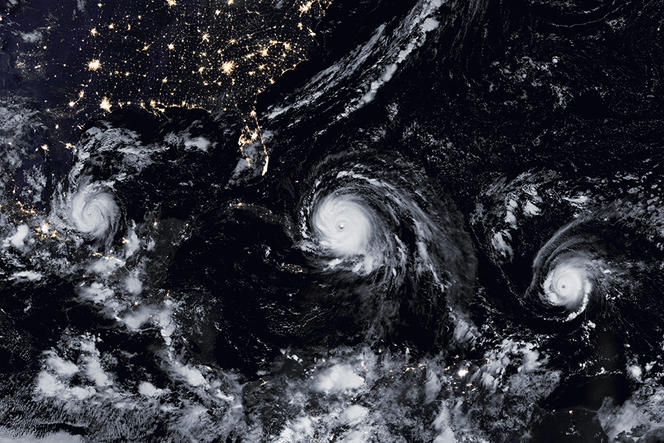
And the ocean plays a crucial role in regulating climate change.
F. G: Yes, and we tend to forget how important it is. Since the start of the Industrial Revolution, it has absorbed a third of all anthropogenic carbon dioxide. Today, oceans store 25% of atmospheric CO2, and soak up 90% of the planet's excess heat trapped by greenhouse gases. That amount has doubled since 1997, with dreadful consequences. The first is that excess CO2 is making our oceans more acidic, thus preventing certain organisms from thriving and has clear knock-on effects on biodiversity and the entire food chain, by displacing or destroying populations and ecosystems. The second is that a warmer ocean captures less carbon, which means more CO2 will be trapped in our atmosphere, at a faster rate. The third is ocean dilation because, at equal quantities, the volume of hot water exceeds that of cold water. This is added to the melting of the polar ice sheets and glaciers, which accounts for at least 50% of rising sea levels, with its known consequences on our coasts and small islands. And of course, rising ocean temperatures also contribute to making hurricanes more powerful.
How long have we known all this?
F. G: Not that long, if compared to what we know about space, for example. There still are many technical and understandable challenges to doing research at sea and underwater. What I find interesting is that we had to wait until 2013—and the IPCC's5 fifth assessment report—to start talking about the oceans at a policy level when addressing climate change.
Agathe Euzen: And it's only a year later during the COP21 that we started to see a lot more interaction between different elements and disciplines, including farming and agriculture, urban issues and the role of cities, and the ocean and how it regulates the Earth system.
In fact, the Ocean and Climate Platform, which you, Françoise Gaill, are presiding, was instrumental in having the ocean featured in the COP21 UN report.
F. G: At some point, it was even taken out, but there was tremendous pressure to put it back—especially from the SIDS.6 The Ocean and Climate Platform was very important—to promote the role of the ocean during climate negotiations and share all available scientific knowledge on the issue. But it wasn't just the Platform, France's then minister Laurent Fabius, as well as the president of the COP21, Ségolène Royal, played key roles as well.
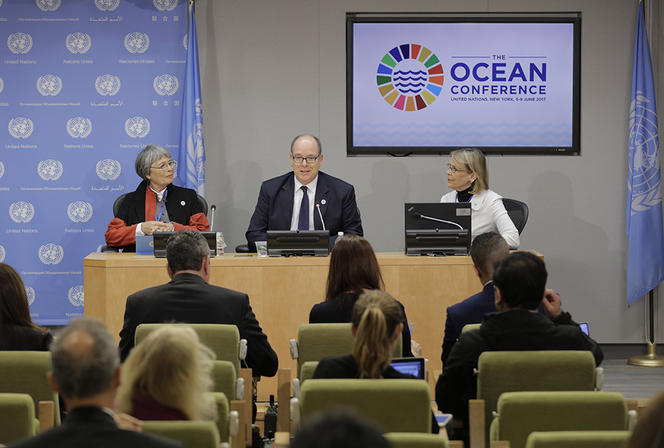
And in a way, your book The Ocean Revealed extends this mission. It is a very accessible, yet complete overview of what we know about the ocean today, through a cross-section of all disciplines. Why is it that this body of water, which we live next to, eat out of, travel on and which is so present on our 'blue' planet, is so little known?
A. E.: We learn about the water cycle at school, and how the ocean fits. But that's about it. All things terrestrial are easier to apprehend. The ocean is at the same time invisible, inaccessible, and infinite—it's our horizon. And it's in 3D—its depth is an unknown world that has always been a mystery. Yet others have been exploring it, because of the resources it may harbor. So in a way, the less we talk about the ocean, the better off others may be—those exploiting these resources, for example.
P. C.: It's always symbolized freedom, because when you're 100 km from the shore, who is really going to check? And it's everything but empty. We only have to look at transport and maritime routes, mineral extraction, fishing... there are strategic issues, so although we don't talk a lot about the ocean, it's a very busy place.
Denis Lacroix: And it is precisely because we still know so little about our oceans, its functions and services that we are so helpless at managing its resources.
Looking at overfishing, for example, today some 30 to 40% of species are overexploited.
P. C.: The ocean has reached its limit. Each year, it provides some 100-120 million tons of fish, the most traded food product worldwide. But in the past 10 years, it has reached a plateau. It is true that the Food and Agriculture Organization (FA0) reports that average apparent per capita consumption of fish increased from about 9 kg per annum in the 1960s to some 20-25 kg today, but it now includes aquaculture. And many species like anchovies and sardines are converted into fishmeal to feed freshwater aquaculture. In fact, 30 million tons of fish products are fed to a host of other species. In the case of overfishing though, there are ways of reversing the trend, like replenishing stocks by suspending fishing for a period of time. And it works: bluefin tuna can be fished in the Mediterranean again, for example. But there are other parts of the world—the China Sea, to name but one—which may be under stress for quite some time.
Another—and more visually haunting—stress on our oceans is pollution, especially by plastic.
A. E.: Plastic is a major stress on biodiversity and marine species. We still know very little about it. Some people talk of a continent of plastic at sea. What really matters, however, is what it means for our food chain. Indeed, if this plastic is assimilated in organisms that are eaten by fish, it comes back to us indirectly. Colonization of the living by these plastic particles will have a tremendous impact on our health. Only 5 years ago, we thought that we were dealing with inert particles in the ocean. But studies show that it goes into every food chain: from plankton to fish, marine turtles, and sea birds, plastic is present in all marine organisms. While initiatives are being investigated to collect waste from our oceans, it is first and foremost our responsibility to improve its management and produce less of it, as pollution may inevitably continue to increase.
P. C.: There are areas of our oceans that are absolutely filthy. In the North Adriatic, for example, there are more plastic debris and rubber tires than fish, in terms of tonnage. All of our human activity lies at the bottom of our oceans.
D. L.: The priority given to the short term in most management policies will ultimately translate into to very high costs in terms of pollution, loss of resources and ecosystem services that are vital to humanity. We are only just starting to become aware of this inconsistency. The Sustainable Development Goal 147 is now on paper, taking action is next.
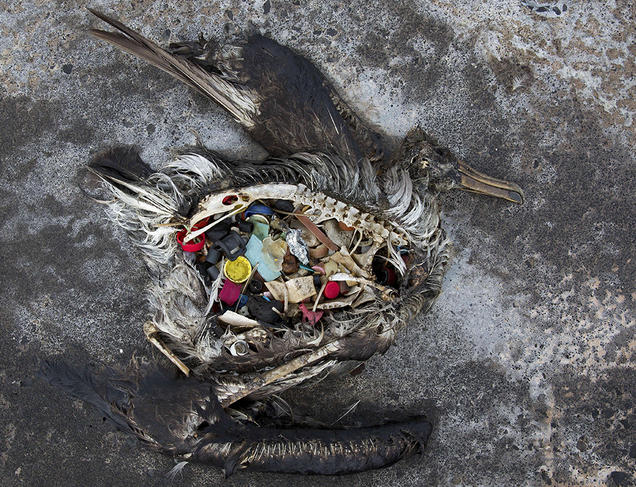
And yet this seafloor holds much-unexplored biodiversity. The marine biologist Sylvia Earle famously said that it was easier to go to space than to reach the bottom of the ocean.
F. G.: We are only just beginning to understand the surface of the ocean. Research at depth is costly, and submarines are expensive. Defense budgets are more easily spent on space observation—of us humans—than on marine species. And yet the seabed harbors amazing treasures. Regarding deep measurements and cartography, we've only covered about 5% of the surface of the ocean floor, with a resolution that integrates the living. Hydrothermal vents at the bottom of our oceans were discovered very recently. And environmental genomics will be able to predict how organisms respond at the genetic level to changes in their surroundings (see our chapter on Tara oceans).
What do you believe will be the next frontier for ocean research?
F. G.: I think that the next 10 years will be focused on what we call the deep sea benthic zone—the lowest ecological region of a body of water, over 500 m. We need to learn more about the deep ocean, which is the only environment that regenerates the entire system. But it's extremely slow, on the geological timescale. The deeper you go, the slower things occur—we're on century time-scales.
P. C.: There is an incredible biodiversity deep down but it depends on the nature of the sea floor: there may be a tremendously high number of species in abyssal plains compared to that of vent species, even though in the latter case, the biomass is one of the most spectacular forms of life on earth. In terms of genomics, new molecules can be used for health purposes. Biopolymers are highly thermostable, enzymes: they work in very harsh conditions, and these are treasures that we have only just started to explore.
On 26 March 2012, Canadian film director James Cameron piloted the Deepsea Challenger, a deep-diving submersible designed to reach the bottom of Challenger Deep, the deepest-known point on Earth. This was the second manned dive to ever reach the Challenger Deep.
The main challenges to preserving this unique environment, in terms of biodiversity, overfishing, pollution, maritime transport, extraction—and research—need to be taken up at the global level, and yet that is proving extremely difficult. Why is that?
F. G.: The first mention of ocean governance was in 1635 when the Englishman John Selden published Mare Clausum, which questioned the need for ownership of the seas. It was mainly to counter an earlier text by a Dutchman Hugo Grotius who advocated freedom to navigate and trade across the seas. You have to wait until 1973 and the United Nations Convention on the Law of the Sea (UNCLOS) for the closest agreement we have to a ‘Constitution for the Ocean’: peaceful use of the sea, protection and preservation of the marine environment... Today however, many actors with specific interests coexist, which makes things very challenging. For example, the UN held discussions this July on marine genetic resources. The ocean surface is managed by the International Maritime Organization (IMO) which is mostly driven by maritime shipping companies, but its floor belongs to the common heritage of mankind—where the UN has jurisdiction via the International Seabed Authority (ISA).8 In between, there is nothing but the above-mentioned rules in favor of fishing activities, as the water column does not fall under any jurisdiction. The trend is to say that countries are now responsible for the environment but there is a need for a legal framework for areas outside their jurisdiction. And in a natural space that does not belong to any state, but is occupied by the private sector, what do you do? At the moment, those who are in favor of a common heritage believe we should extend it to the entire ocean. It's also a paradox for scientists, who need the freedom to study in all those areas. One of the book's chapters suggests an in-between solution, between shared goods and services, and common heritage. Much work needs to be done in the coming years to find a formal international agreement on genetic resources. For example, the EU’s position is to grant access to genetic resources while promoting fair and equitable sharing of their benefits.9
This would be your preferred solution.
F. G.: Indeed.
D. L.: The world's largest exclusive economic zone (EEZ), in all of the world's oceans, now falls under European jurisdiction (15 million km2, 11 of which are under French responsibility). Europeans are therefore liable for protecting their sustainability.
To end on a positive note, 24 countries and the EU drafted an agreement that will come into force this December for a period of 35 years: the creation of the Ross Sea region Marine Protected Area (MPA), which covers 1.55 million square kilometers off Antarctica.
F. G.: It's great to see that such things are possible. It's deep ecology. Research needs to embrace and be involved in these projects, because some areas must be preserved from human activity. Joachim Claudet, one of the authors of the book, quotes Sigmund Freud, saying that ‘a nation whose wealth rests on the exploitation of the produce of its soil will yet set aside certain areas for reservation in their original state and for protection from the changes brought about by civilization.’
A. E.: And we are only beginning to measure the consequences of human activity on our oceans. These disturbing images of dead birds with plastic in their stomachs are only the tip of the iceberg. We still don't fully understand its impact at all levels. What we are seeing in terms of extreme events will be the same with regard to pollution. It will come back to us. So we must apprehend the links between all these systems, and not consider this environment as infinite. We are only beginning to grasp the ocean’s essential role in regulating the Earth systems. So concerning anthropogenic activity, it is essential that we act on land to save our oceans, the lungs of our Earth.
- 1. Deputy director at Institute of Ecology and Environment (CNRS). Laboratoire techiques, territoires et sociétés (CNRS / Ecole des Ponts ParisTech).
- 2. Former Director of the CNRS Institute of Ecology and Environment (INEE), Françoise Gaill is currently Coordinator of the scientific board of the Ocean & Climate Platform.
- 3. Coordinator for strategic scanning and foresight analysis at the Scientific directorate of Institut Français de Recherche pour l'Exploitation de la Mer (IFREMER).
- 4. Senior Scientist at the Institut de recherche pour le Développement (IRD).
- 5. The Intergovernmental Panel on Climate Change (IPCC) is a scientific and intergovernmental body under the auspices of the United Nations.
- 6. Small Island Developing States.
- 7. Conserve and sustainably use the oceans, seas and marine resources for sustainable development.
- 8. See the chapter The international law of the sea in 2017, page 264.
- 9. See the chapter Marine biodiversity law in areas beyond the limits of national jurisdiction, page 266.



